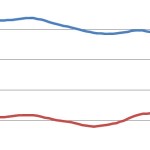Climate Change by Anecdote and Science
Just up on the Providence Journal Web page is a new part of “a special report on Confronting Climate Change in Southern New England.” The story is about steps that some local businesses are taking in response to recent extreme weather events, and it’s generally interesting, as a tale of local life, but the larger purpose of reporter Patrick Anderson, one suspects, is to have some anecdotal spikes with which to garland a more-political narrative, as follows:
The resilience of businesses along Rhode Island’s southern shore after Sandy mirrors the approach much of New England has taken to severe weather and the persistent, advance of the ocean — linked to climate change.
The actual business owners seem to be deciding things more as a matter of interest, investment, and risk, but (scary music) we all know that climate change is coming! One wonders how much Democrat Senator Sheldon Whitehouse’s political rhetoric inspired the story. The odd thing is that it’s actually a simple matter to look into how much the ocean has risen in the area. Of course, the answer “not much at all in the past two decades” would complicate the narrative.
As a fan of complicated narratives, though, I thought I’d throw in E. Calvin Beisner’s thoughts on a recent U.S. Senate hearing about climate science. Beisner’s basic conclusions are that the science isn’t settled and that there’s reason to doubt alarmist claims, not the least because of government influence:
Christy, Curry, and Happer also testified that government funding of climate research biases subjects chosen for research (e.g., lots of focus on human causes of climate change and little on natural causes), and Steyn joined them in testifying that threats (by Rep. Raul Grijalva [D-AZ] and Sen. Sheldon Whitehouse [D-RI]) to investigate and prosecute skeptical scientists under RICO (Racketeer Influenced and Corrupt Organizations) law had a “chilling effect,” undermining both First Amendment freedoms of speech and press and the free inquiry essential to scientific progress.
They recommended instead that the federal government should fund competing research teams in climate just as it has done on other issues. When the two teams critique each other’s work, both improve.
Of course, then the debate would have to be covered, rather than reported as if it were over.


